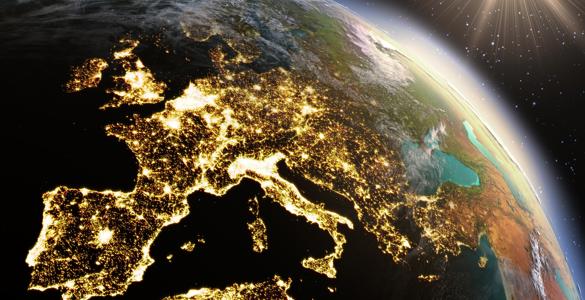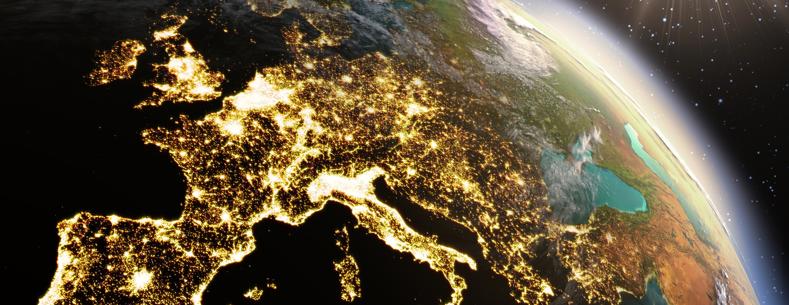Please make no mistake - climate change is the biggest threat to security that modern humans have ever faced.
There is no going back - no matter what we do now, it's too late to avoid climate change and the poorest, the most vulnerable, those with the least security, are now certain to suffer.
If we bring emissions down with sufficient vigour we may yet avoid the tipping points that will make runaway climate change unstoppable. In November this year, at COP26 in Glasgow, we may have our last opportunity to make the necessary step-change.
Sir David Attenborough addressing the UN Security Council 2021
From 1-12 November, around 30,000 delegates and 200 world leaders will attend the 26th United Nations Conference of the Parties (COP26) in Glasgow. Under the joint presidency of the UK and Italy, COP26 heralds a key moment in efforts to raise global climate ambition.
The talks are widely considered to be the last opportunity to deliver on commitments to keep global temperature rise to within 1.5 – 2°C. To meet the COP goals, the summit covers a range of themes, including transport, nature, energy, gender, climate adaption and youth empowerment.
A key priority for COP26 is full implementation of the 2015 Paris Agreement, which requires all parties to prepare, communicate and maintain national greenhouse gas (GHG) reduction targets. Known as Nationally Determined Contributions (NDCs) these set out each party’s efforts to reduce national emissions. While Wales, along with the other countries of the UK, is not a signatory to the Paris Agreement, the UK as a whole is. As a significant contributor to UK emissions – particularly in the industry and agriculture sectors - Wales’s contribution is crucial to UK climate leadership and action on the global stage.
Many parties are yet to set out adequate emission cuts within their NDCs to keep global warming within "safe" limits. Global temperature rise is driven by cumulative emissions over time meaning immediate reduction of GHGs is essential. The UK and Welsh Governments have committed to reduce emissions to net-zero by 2050. Net-zero means a balance between emissions by source (e.g. transport and agriculture) and removals by sinks (e.g. trees and peat). It is the state at which our contribution to global warming stops. A full list of countries which have set out legally binding or policy commitments on net zero, and by which date is available on the Energy and Climate Information Unit (an independent advisory body) net-zero tracker.
Climate change framework
COP is the international United Nations Framework Convention on Climate Change (UNFCCC) conference. It’s held every year and attended by signatory countries and other parties.
The UNFCCC was adopted in 1992 during the Earth Summit, held in Rio de Janeiro. It has been ratified by 196 States (including the UK), which constitute the “Parties” to the Convention. The treaty aims to “stabilize greenhouse gas concentrations in the atmosphere at a level that would prevent dangerous anthropogenic interference with the climate system”. The Energy and Climate Intelligence Unit has produced a useful history of COPs from Berlin in 1995 to Glasgow in 2021.
The UNFCCC is guided by scientific assessments from the Intergovernmental Panel on Climate Change (IPCC). These are published every seven years and set out the global state of climate change. The IPCC’s first report was published in 1990. The Sixth Assessment, Climate Change 2021: The physical science basis, was published in August 2021. It covers the most up-to-date understanding of climate change science.
The report made headlines globally. The UN called it “code red” for humanity, with the IPCC saying it is “unequivocal that human influence has warmed the atmosphere, ocean, and land” and going on to say:
The scale of recent changes across the climate system as a whole and the present state of many aspects of the climate system are unprecedented over many centuries to many thousands of years.
UK Priorities
Alok Sharma, the President Designate for the talks, set out four key UK goals for COP26 in a speech in March 2020:
- All countries to submit more ambitious Nationally Determined Contributions (NDCs), committing to further cuts in carbon emissions by 2030;
- All countries to commit to reach net-zero emissions as soon as possible;
- Developed countries to honour their commitments, including meeting the 2020 US$100bn dollar a year goal for climate finance; and
- Seeking to agree a package which takes forward the Paris Agreement.
He also provided an update on progress on all the goals to the UK Parliament in a written statement on 18 March 2021.
Wales and COP26
It’s not clear exactly what role the Welsh Government will play at COP26, although we do know that Welsh Ministers and officials will be heading to Glasgow as part of the UK delegation. Alongside COP26 the Welsh Government has organised a series of events, COP Cymru, including:
- The launch of its second low carbon delivery plan “Net Zero Wales” on 28 October;
- COP26 Regional Roadshows to coincide with the dates and themes of the Glasgow COP programme; and
- Wales Climate Week (22-26 November).
To find out more about how Wales is progressing on the path to net zero, and the legislation supporting action, read our key issues article.
For more detailed background on COP26 read these briefings from the Scottish Parliament Information Service and House of Commons Library. Look out for more articles and tweets from Senedd Research during COP26 and Wales Climate Week.
The need to deliver
The IPCC report was stark in its findings, and there is widespread recognition of the need to deliver on the Paris Agreement. But there have been rumblings that COP26 may not be able to deliver on its ambition. Success will depend on the submission of more ambitious NDCs and discussion on the thorny issue of climate finance. Based on the present commitments of Member States, the UN Secretary General has warned:
…the world is on a catastrophic pathway to 2.7-degrees of heating, instead of 1.5 we all agreed should be the limit, Science tells us that anything above 1.5 degrees would be a disaster.
The eyes of the world will be on Glasgow in the coming weeks.
Article by Chloe Corbyn, Senedd Research, Welsh Parliament






